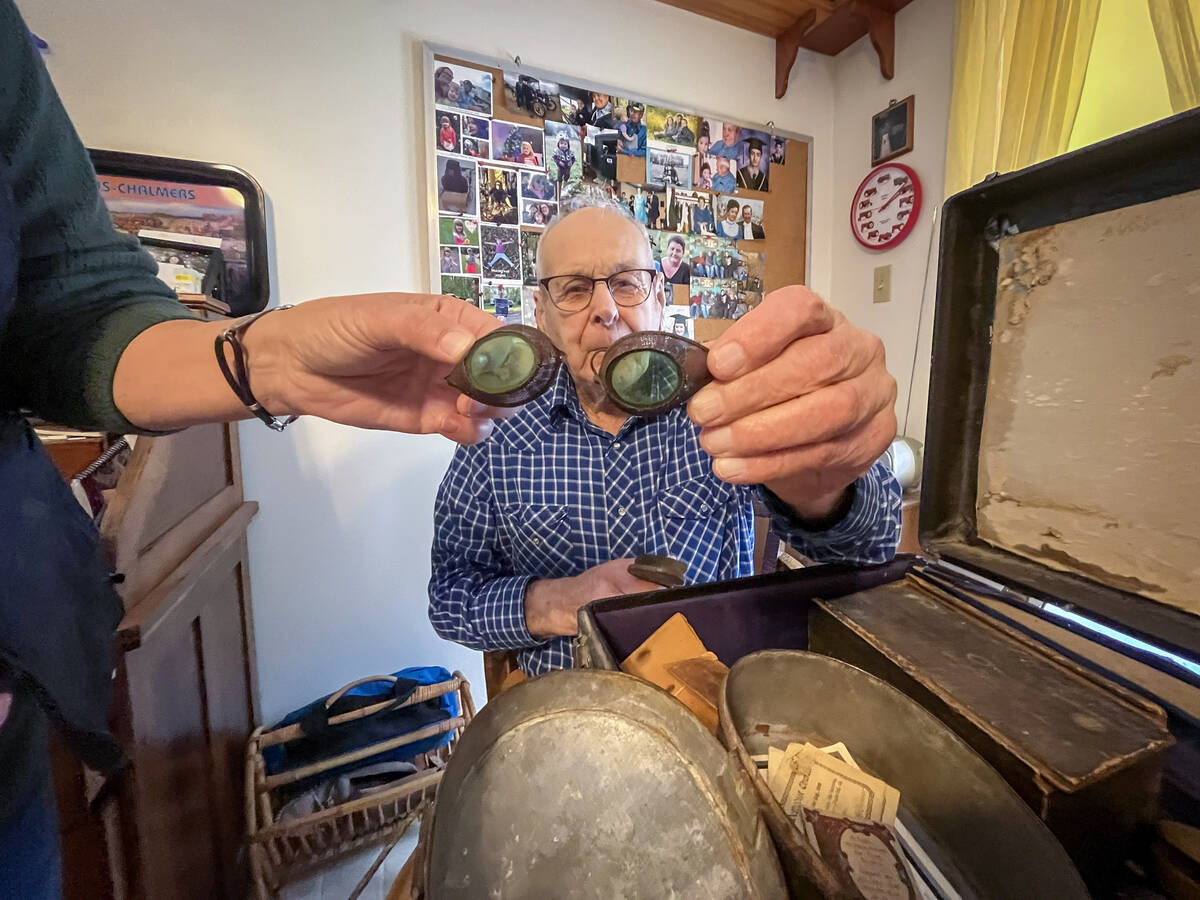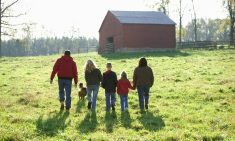Any farm family going through the transition process will tell you it’s far from simple. There are so many moving parts. It takes time and energy to work out all the changing roles and the new responsibilities, and also to scrutinize the legal agreements and to figure how these are going to affect family dynamics and relationships.
“It’s not something where an advisor can come in and say ‘You’re here today. In 12 months this is where you’re going to be at’,” says Trevor MacLean, an agriculture business and succession advisor at MNP.
“It’s an ongoing dialogue that has to take place between family members.”
Read Also

The why and how of preserving farm family history
Part two of a series explaining why and how to preserve farm family history.
Even so, there may be a way to boost your chances of success. MNP calls theirs a grooming plan, but they are also known as learning or development plans, and the whole point of having one is to help ensure the next generation really is ready — in all respects — to take over the farm business.
“People often think ‘My kids have seen me run my business for 20 years, they should be able to do it,’ but you need a formalized plan to improve the skill set of the next generation,” says Danielle Walsh, a family business practitioner with MNP who helps families develop their development plans.
“In farming, if you have someone who is good at the technical pieces, it doesn’t necessarily mean that they’re going to understand the ownership or managerial pieces of the business,” says Walsh. “Grooming is looking at where are you now, what skills you need, and how we can help you gain those skills.”
Start early
Are farms having these discussions, and are they having them early enough? Too often, says Walsh, the answer is no.
It’s essential to identify the skill sets that the new farmer will need. And it’s also essential to take farm realities into account.
For instance, some businesses are highly repetitive. Production is non-stop. The same jobs get done every day. On the farm, by contrast, you only get so many chances for the next generation to ride with you through a planting season, or through harvest. On livestock operations, there are only so many calf crops. If you aren’t ready to transfer the greatest possible amount of learning during those few opportunities, it’s hard to make up that ground later. It may even be impossible.
“You have to consider this when you’re building your personal or professional grooming plan,” Walsh says. “If you miss the harvest once, you have to wait a whole year to train someone to do that practice and you are behind.”
The ideal, after all, is to have the incoming generation do all the major jobs often enough to really understand them before they find themselves having to be in charge.
So, as a farmer, what do you do if you haven’t been taking a structured approach to development? First, realize you aren’t alone.
“Farmers are the ones that document and plan for these things the least,” Walsh says. And, she adds, this “is probably why farms often have a hard time with a successful transition.”
The first step — have a meeting
Before it can even start a development plan, the family has to establish the right environment for it. It helps to be holding proper business meetings with an agenda and minutes, correct language and rules so the family has a forum to help everyone build respect for each other and to be accountable for what they all need to do to ensure the development plan is put into action.
But even something as simple as having a meeting agenda can be uncomfortable for a lot of farm families who are not used to documenting things. “Starting that process can be as simple as saying, we are going to plan for this meeting,” MacLean says. It also means having a process from the outset to document decisions and assign who will do followup. It means sending out minutes and agendas, “all the things that farm families are typically not good at,” MacLean says. “That will substantially help reduce the miscommunication and misunderstandings.”
Walsh agrees on the need to document the process. “If we don’t have that, now there is a 30-minute argument about how every time you do something since you’ve been a kid, you always say it’s my fault, and then 30 years of baggage comes out,” she says. “I have found, with the farmers that I’ve worked with, that I usually have to start the process, send out the agenda and chair the meeting because the farmers won’t do it. But once they see the benefit of it, they pick it up and do it on their own.”
Emphasize financial skills
Even in families that like the idea of a development plan, Walsh and MacLean find what gets left out are financial skills.
“There is often a lack of basic understanding of financial statements, cash flows, where’s our profit, where are the costs, etc.” Walsh says. “The number of times I hear the next generation say ‘oh we just need to buy all this equipment.’ Well, it sounds good, and, yes, you can find efficiencies, but where is that money going to come from?”
Which leads to another task that the next generation is often not prepared for: going to the bank and actually having to negotiate a loan.
“Often they don’t know what getting a loan looks like, or what banking covenants are,” she says. “A lot of that detail the next generation never sees until they become an owner and then they are trying to figure it all out. Even understanding that, when you have loans, you need to get your financial statements reviewed because that’s part of your banking agreement. Most of them have no idea what that entails.”
Get non-farming family members on side
Then there are common issues that arise with family members who aren’t actively farming but are still owners, something that many new farm managers find difficult to navigate.
“Who signs for what? Who puts personal guarantees up? These can become contentious issues and I find it’s something that all the owners tend to have very little knowledge on,” Walsh says. “Often the older generation may not have that knowledge either but they relied on advisors. We need multiple next generations to make those decisions and every single one needs to have a certain level of understanding.”
Get them used to making decisions
The next generation can often take orders and do their job well, but they don’t necessarily know how to make decisions and to give the orders.
“We’re often seeing families where they can all do their jobs but once that person making the decisions at the top is gone, how does the next generation make a decision and know that it’s going to work?” Walsh asks. “The grooming plan can help them learn how to make decisions together, how to practice doing those things before they’re left with the high-stake, high-risk decisions to make alone.”
Transfer your relationships with business advisors
Relationship transfer is also often overlooked in terms of transitioning the relationships that Mom and Dad, or whoever is at the helm of the business, have always had with the professionals and other outside people needed to make the farm run.
“Are they transitioning those relationships, or are the kids going to be allowed to co-develop their own new relationships that will come in and help steward them as they come into their new role?” MacLean asks.
Find mentors
Experienced mentors can make a huge difference to the next generation as they move from being basic farm workers to owners and managers, but they need to realize that Mom and Dad can’t always be those mentors, or at least not for every skill they are going to need.
“While we look up to our parents, it’s also very hard to take what they say and implement it,” Walsh says. “Many of my clients tell me, ‘I’ve been telling them this for 10 years, you come in and say it once and now they’re doing it.’ But, it’s because I’m not their mom and dad.”
Mentors are not always easy to find, so it often comes down to just finding someone to talk to who can help coach both generations through the hardest conversations and issues.
“I often coach the older generation and sometimes, they just need to vent,” Walsh says. “I find it better to let them have their feelings and talk it through with me … it can be hard to watch someone else do something but we need to let them try because that’s part of letting them make decisions and practice these skills. It can be really hard.”
What can hold some farmers back from seeking mentors or other advisors is pride because they don’t want to admit that they need help to better understand aspects of their business that they feel they should already know. But with farm businesses getting ever more complicated and multi-layered, Walsh says they shouldn’t feel that way.
“The interconnectedness and all the areas that you have to know as a farmer are getting more complex,” MacLean agrees.“Having a mentor or advisors, especially as you transition but even as you take over the business and you’re trying to implement new things, can be crucial for success.”
Write it down, and keep to it
The development plan is a valuable part of the process because it helps hold everyone accountable to learn the skills that are needed to ensure a smooth transition and for the farm to continue to be successful for the future. But it needs to be a formal, written-down plan, and it needs timelines.
“If I’m the older generation and you owe me a pile of money for the farm and that’s essentially my pension for the next 10 or 20 years, I need to know that you and your next generation have the skills,” Walsh says.
Then, get tough on excuses. “It can be easy for people to say that they don’t have time to learn things like the finance piece or loans or whatever it is that scares them,” Walsh says. “If they don’t want to do it then, they’re never going to get to it.”
Documentation tackles this head on. “The documentation doesn’t need to be complex as long as it’s on paper that by this date, this is what I’m focusing on,” Walsh says. “If you don’t document it, it’s so easy for all of that to go away and those skill sets are never learned.”
















